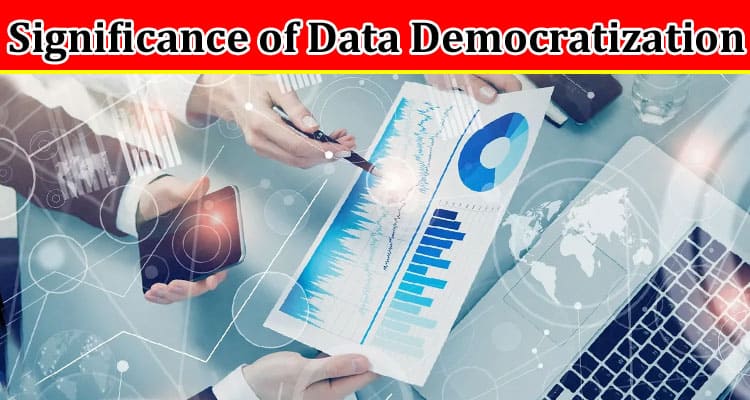In today’s digital age, data plays a crucial role in decision-making and driving business success. The ability to harness and utilize data effectively can provide organizations with a competitive edge. However, data has often been siloed and accessible only to a select few within an organization, limiting its potential. This is where the concept of data democratization comes into play. It refers to the process of making data accessible and understandable to a broader audience, empowering individuals across an organization to leverage data for informed decision-making. In this article, you will delve into its benefits and how organizations can unlock the power of data to drive growth and innovation.
The Benefits
Empowering Decision-Makers
It empowers decision-makers at all levels of an organization. By breaking down data silos and providing access to relevant and meaningful information, decision-makers can make more informed choices. Whether it’s a front-line manager, a marketing executive, or a CEO, access to data allows them to gain insights, identify trends, and align strategies with organizational goals. This democratization of data enables faster, data-driven decision-making, reducing reliance on gut instinct or incomplete information.
Fostering Innovation and Collaboration
It encourages a culture of innovation and collaboration within an organization. When data is accessible to a broader range of employees, ideas can be generated from various perspectives and domains. Different teams and departments can leverage data to identify new opportunities, optimize processes, and develop innovative solutions. By democratizing data, organizations break down information silos and facilitate cross-functional collaboration, leading to enhanced creativity and problem-solving.
Enhancing Employee Engagement and Empowerment
The direct impact it has is on the engagement and empowerment of employees. When employees have access to data, they feel more connected to the organization’s goals and objectives. They become active participants in the decision-making process and can contribute their insights and expertise. This increased involvement fosters a sense of ownership and accountability, driving employee engagement and motivation. Additionally, democratization enables individuals to track their performance, set goals, and measure progress, further empowering them to take charge of their own success.
Improving Operational Efficiency and Agility
It also improves operational efficiency and agility. When data is accessible to all relevant stakeholders, it streamlines workflows and eliminates bottlenecks. Teams can access real-time information, identify areas for improvement, and make data-driven adjustments on the fly. This agility allows organizations to respond quickly to market changes, customer demands, and competitive threats. By democratizing data, businesses can optimize their operations, reduce costs, and gain a competitive advantage.
Unlocking the Power
Establish a Data Governance Framework
To unlock the power, organizations must establish a robust data governance framework. This framework ensures that data is managed effectively, adheres to privacy regulations, and maintains data quality and integrity. It includes defining data ownership, establishing data access controls, and implementing data management processes. A well-defined data governance framework provides the necessary structure and guidelines for data accessibility while maintaining data security and compliance.
Invest in Data Literacy and Training
It requires a workforce that is equipped with the necessary data literacy skills. Organizations should invest in training programs and initiatives to enhance data literacy across the board. This includes educating employees on data analysis, interpretation, and visualization techniques. By building a data-literate workforce, organizations can maximize the value derived from data and ensure its effective utilization for decision-making purposes.
Implement User-Friendly Data Visualization Tools
To make data accessible and understandable to a broader audience, organizations should invest in user-friendly data visualization tools. These tools enable individuals with varying levels of technical expertise to interact with data, explore insights, and generate visualizations without relying on IT or data science teams. Intuitive and visually appealing dashboards empower users to derive meaningful insights from complex data sets, fostering a culture of data-driven decision-making.
Foster a Data-Driven Culture
Unlocking the power of transparency requires a shift towards a data-driven culture. Organizations should promote and incentivize data-driven decision-making, encouraging employees to utilize data in their day-to-day activities. This includes recognizing and rewarding individuals and teams that demonstrate data-driven successes and fostering a sense of excitement and motivation around data. By embedding data into the organizational DNA, organizations can leverage transparency to drive innovation and achieve strategic objectives.
Conclusion
Data democratization is a powerful concept that unlocks the potential of data within organizations. By making data accessible to a broader audience, organizations empower decision-makers, foster collaboration and innovation, enhance employee engagement, and improve operational efficiency. To unlock the power of transparency, organizations must establish a robust data governance framework, invest in data literacy and training, implement user-friendly data visualization tools, and foster a data-driven culture. Embracing data democratization enables organizations to harness the power of data and drive growth, competitiveness, and success in today’s data-driven world.





